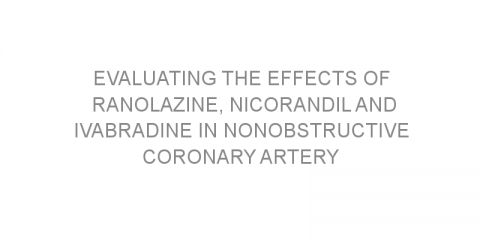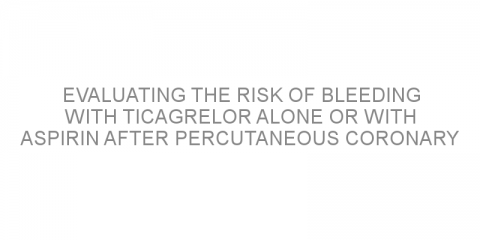In a nutshell This study investigated if hemoglobin (Hb) levels can predict clotting or bleeding risk (CR/BR) after a percutaneous coronary intervention (PCI). They found that lower Hb was associated with higher CR/BR after PCI. Some background Coronary artery disease (CAD) is caused by reduced blood flow to the heart. Surgical procedures can be...
Read MoreCoronary artery disease Posts on Medivizor
Evaluating the effects of ranolazine, nicorandil and ivabradine in nonobstructive coronary artery disease
In a nutshell This study investigated the effects of ranolazine (Ranexa), nicorandil (Ikorel), and ivabradine (Corlanor) on angina. The main finding was that ranolazine and ivabradine reduced angina and nicorandil reduced microvascular resistance. Some background There are many drugs approved for the treatment of angina. These include ranolazine,...
Read MoreEvaluating the risk of bleeding with ticagrelor alone or with aspirin after percutaneous coronary intervention
In a nutshell This study investigated the effect of ticagrelor (Brilique) with or without aspirin on bleeding risk after a percutaneous coronary intervention (PCI). They found that ticagrelor alone reduced bleeding risk compared to ticagrelor + aspirin in these patients. Some background Coronary artery disease...
Read MoreDoes marine omega-3 supplementation decrease the risk of cardiovascular disease?
In a nutshell This study investigated whether marine omega-3 supplementation is associated with a reduction in the risk of cardiovascular disease (CVD). Researchers suggested that omega-3 is associated with a risk reduction of CVD. Some background CVD is the leading cause of death for both men and women in the US. It refers to conditions that involve...
Read MoreA review of 5-year outcomes after PCI or CABG intervention for left main coronary disease
In a nutshell This study investigated outcomes after 2 surgical interventions to treat coronary artery disease (CAD) in the left main artery. They found no difference in outcomes after percutaneous coronary intervention (PCI) or coronary artery bypass graft (CABG) in these patients. Some background Coronary artery disease (CAD) is caused by...
Read MoreBiodegradable sirolimus versus durable everolimus stents – which is more effective after a heart attack?
In a nutshell This study investigated the effects of different drug-eluting stents (DES) in percutaneous coronary intervention (PCI) in patients who have had a heart attack. They found that biodegradable sirolimus (BS) stents were better than durable polymer everolimus (DPE) stents in improving blood flow. Some background Percutaneous...
Read MoreTicagrelor – is it effective in preventing major cardiac events in patients with diabetes and coronary artery disease?
In a nutshell This study investigated ticagrelor (Brilique) added to aspirin in patients with coronary artery disease (CAD) and diabetes mellitus (DM). They found that ticagrelor reduced the risk of cardiac events in these patients. Some background Patients with diabetes have a higher risk of ischemic events (IEs). IEs are caused by a lack...
Read MoreIs a stent procedure or bypass surgery more effective for patients with severe heart disease?
In a nutshell This study compared the outcomes of stent versus artery bypass surgery for patients with severe heart disease. The authors concluded that both procedures improved survival, but patients with three-vessel heart disease benefitted more from artery bypass surgery. Some background Heart disease (HD) requires different...
Read MoreDrug-coated balloons in percutaneous coronary intervention: is it a suitable option for patients with bleeding risk?
In a nutshell This study investigated drug-coated balloons (DCBs) used for percutaneous coronary intervention (PCI) in patients with a high risk of bleeding. They found that DCBs were superior to bare-metal stents (BMSs) in these patients. Some background Coronary artery disease (CAD) is caused by blockages in the coronary arteries. This reduces blood...
Read MoreCan eosinophil cell counts predict coronary artery disease severity?
In a nutshell This study investigated if eosinophil cell counts (ECCs) are associated with coronary artery disease (CAD). They found that ECC is associated with CAD severity. Some background Coronary artery disease (CAD) is a condition caused by reduced blood flow to the heart. Reduced blood flow in the arteries is caused by a process...
Read MoreEvaluating the long-term outcomes of angioplasty for patients with coronary heart disease
In a nutshell This study compared the long-term outcomes of different coronary angioplasty procedures in patients with coronary heart disease (CHD). The authors found that staged CA was better at reducing the risk of complications compared to culprit CA. Some background CHD is caused by the narrowing of blood vessels that supply the heart...
Read MoreAcupuncture and angina – can alternative medicine improve disease management?
In a nutshell This study investigated the effect of acupuncture on angina management. They found that acupuncture reduced the rate of angina attacks. Some background Coronary artery disease (CAD) is caused by reduced blood flow to the heart. Angina is the term used to describe chest pain due to reduced blood flow. Many patients with CAD...
Read More














